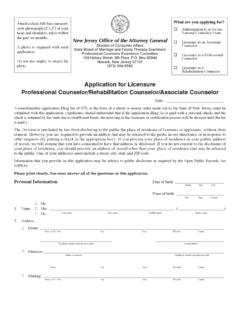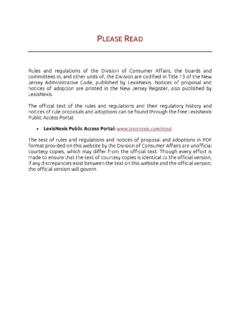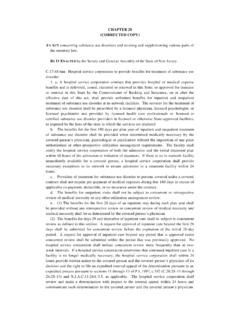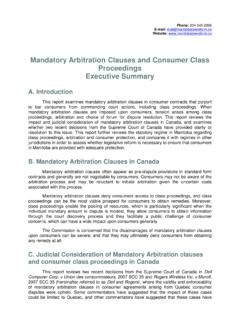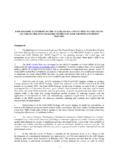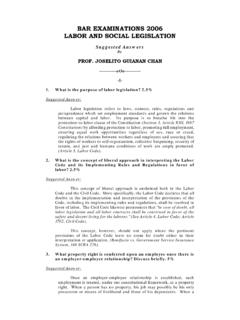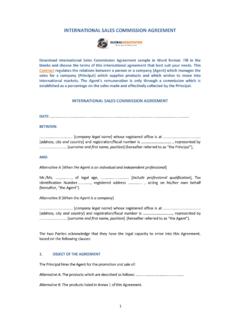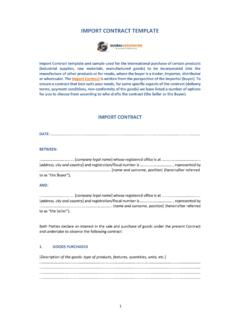Transcription of Predatory Lending? - New Jersey Division of Consumer Affairs
1 Consumerbrief800-242-5846 New Jersey Division of Consumer isPredatory Lending? Predatory lending is the use of unfair and abusivemortgage lending practices that result in a borrowerpaying more through high fees or interest rates thanhis/her credit history warrants. Due to the complexity ofmortgage transactions, it is often difficult to tell thedifference between a legitimate and Predatory New Jersey Home Ownership Security Act, whichbecame law in 2003, provides New Jersey citizens withsome of the strongest safeguards in the nation. The law isdesigned to stop Predatory lending practices and keephomeowners from unfairly losing their homes and enacted in July 2004 confirmed the law scentral provisions which provide homeowners with strongprotections from Predatory lenders while ensuring accessto credit for New Jersey law protects consumers by, among other things: prohibiting high-cost home loans with balloonpayments*; giving victims the right to protect themselves andrecover damages for violations of the law; and placing tough restrictions on lenders that offerhigh-cost home loans.
2 (* A balloon loan is one in which the monthly payment is notintended to repay the entire loan. The final payment is a largelump sum of the remaining principal and is called a balloonpayment. ) Predatory lending practices have included: Charging excessive interest rates not justified bythe risk involved. Charging and financing excessive points and fees. Loaning money based on the value of theproperty, when it is evident that a borrower willbe unable to repay the loan. Packing loans with additional products like creditinsurance or club memberships. Aggressively and deceptively sellingsingle-premium credit insurance. Charging extended prepayment penalties that trappeople into high-interest loans. Conspiring with home improvement contractorsto solicit loans on damaging terms and/or payingcontractors directly, leaving the borrower no wayto ensure that the work is done.
3 Inflating the appraisal value of a house. Using mandatory arbitration clauses that denyborrowers their rights in court. Misrepresenting the terms and conditions of loans. Using harassing and intimidating collectiontechniques. Targeting high-cost loans to vulnerableborrowers, including the elderly, low income andminority families. Flipping, or repeated refinancing, which resultsin fee revenue for the lender and no benefit tothe Revised 06/01/16 Continued800-242-5846 New Jersey Division of Consumer IS WHAT YOU SHOULD KNOW. Think twice before borrowing against your sure you know what the payments are going tobe and that you can make them. Shop around. Get at least three written quotes forup-front costs, interest rates, terms of the loan andmonthly payments. Do not trust ads promising No Credit?
4 NoProblem! Do not give in to high-pressure sales tactics. Do not take the first loan you are offered. Remember, a low monthly payment is not always a deal. Look at the total cost of the loan. Be wary of promises to refinance the loan at abetter rate in the future. Avoid balloon payments. The monthly paymentmay be small, but the big balloon payment thatcomes due at the end of the loan period could befar beyond your means to repay. Under the Truth-in- lending Act, borrowers canchange their minds for any reason even noreason within three days of signing a contract inwhich their homes are offered as security. Butremember three days is not a long time. It isbetter to research and be comfortable with allaspects of your loan before you sign. Avoid high interest rates, penalties for earlypayoff of your loan and monthly payments youcannot afford.
5 Do not sign a blank document or anything you donot understand, even if they cancel the loan offer. Ask questions if you do not understand theloan terms, and show the documents tosomeone you trust. Be wary of telemarketers or door-to-doorsalespeople who contact you out of the blueoffering bargain loans and claiming thatyour bad credit is no problem. Avoid lenders recommended by homeimprovement you feel that you have been victimized, pleasecontact the New Jersey Division of Consumer Affairs at800-242-5846 or 973-504-6200 (if calling from outsidethe State of New Jersey ). You may also contact the NewJersey Department of Banking and Insurance addition, report your experience to the Federal TradeCommission ( ), which monitors predatorylending scams and frauds on the national level.
6 The be reached, toll free, at 1-877-FTC-HELP (382-4357)or you may write to: Federal Trade Commission, CRC240, Washington, DC online Consumer information on buying a home, go which is a page on theWeb site of the Department of Housing and UrbanDevelopment.
